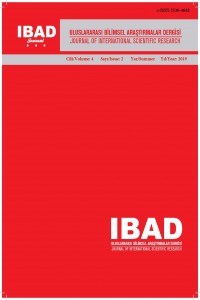Öz
Olasılık
kuramını önceleyen üç olmazsa olmaz koşul vardır. Bunlar bu çalışmada Gaius
Julius Caesar’dan (İÖ 100-İÖ 44) ödünç alınan veni, vidi, vici sözcükleriyle dile
getirilmektedir. Veni, rastgelelik düşüncesindeki değişimi simgeler. Yeni
düşünceye göre rastgelelik artık Tanrısal istemi öğrenmek için bir im değildir.
O, sonuçların öngörülemezliği ile ilgili bir özelliktir. Söz konusu düşünce Chevalier
de Méré gibi kumarseverlerde de, Blaise Pascal
gibi matematikçilerde de ortaktır. Vidi,
rastgele sonuçlarla ilgili alacakaranlıkların
günışığına yakınlıklarını ölçme güdüsü olarak betimlenebilir. Bu, ilk olarak
Tuscany’nin Büyük Beyi ya da Chevalier de Méré
gibi kumarseverlerde gözlemlenen bir özelliktir. Vici ise bu güdüyü doygunluğa ulaştırabilme yeteneği
olarak betimlenebilir. Söz konusu yetenek ilk olarak Galileo Galilei, Blaise
Pascal ve Pierre de Fermat gibi matematikçilerde gözlemlenen bir özelliktir. Bu
matematikçiler eş-olabilirlik kavramından yararlanarak rastgele sonuçlara
ilişkin alacakaranlıkların günışığına yakınlıklarını nicelleştirmeyi başarırlar.
Anahtar Kelimeler
Kaynakça
- David, F. N. (1955). Dicing and Gaming (A Note on the History of Probability). Biometrika, 42, 1-15.
- Galavotti, M. C. (2005). Philosophical Introduction of Probability. CSLI Publications: Stanford/California.
- Gillies, D. (2000). Philosophical Theories of Probability. Routledge: London and New York.
- Hacking, I. (1991). The Emergence of Probability. Cambridge University Press: Cambridge.
- Kendall, M. (1970a). The Beginnings of a Probability Calculus. Studies in the History of Statistics and Probability II (Editor E. S. Pearson-M. G. Kendall), Hafner Publishing Company: London, 19-34.
- Kendall, M. (1970b). Where Shall the History of Statistics Begin? Studies in the History of Statistics and Probability II (Editor E. S. Pearson-M. G. Kendall), Hafner Publishing Company: London, 45-46.
- Korkmaz, A. (2005). Olasılık Kuramının Doğuşu. Ankara Üniversitesi SBF Dergisi, 60 (2), 171-193.
- Korkmaz, A ve Avar, A. (2019). Olasılık: Janus Yüzlülüğün Eski ve Yeni Görünümleri. Uluslararası BilimselAraştırmalar Dergisi (IBAD), 4 (1), 81-92..Kunoff, S. ve Pines, S. (1986). Teaching Elementary Probability through Its History. The College Mathematics Journal, 17 (3), 210-219.
- Locke, J. (1999). An Essay Concerning Human Understanding. The Pennsylvania State University: USA.
- Ore, O. (1960). Pascal and the Invention of Probability Theory. American Mathematical Montly, 67 (5), 409-419.
- Östenberg, I. (2013). Veni Vidi Vici and Caesar's Triumph. The Classical Quarterly, 63 (2), 813-827.
- Pascal, B. (1972). Penseés. Penguin Books: London.
- Pascal, B. (2000). Düşünceler. Kaknüs Yayınları: İstanbul.
- Sambursky, S. (1956). On the Possible and Probable in Ancient Greece, Osiris, 12, 35-48.
- Sarton, G. (1946). The Life of Science (Essays in the History of Civilization). Henry Schuman: New York.
- Todhunter, I. (1865). A History of the Mathematical Theory of Probability (From the Time of Pascal to That of Laplace). Macmillan and Co. : Cambridge and London.
Öz
Three driving forces which are the precursors of probability theory have been represented in this study by the words veni, vidi, vici, borrowed from Gaius Julius Caesar. The first driving force is the new thought of randomness. Randomness that was interpreted as the manifestation of the God’s desire from then on meant nothing less than unpredictability of physical processes. The second driving force, represented by the word vidi, is the awareness of gamblers about that unpredictability is able to quantify. The gamblers tend to the mathematicians by their awareness and desire from them to quantify unpredictability. The accomplishments of mathematicians on this topic are the product of the third driving force represented by the word vici. The mentioned driving force is related to the awareness of equipossibility. An evolution from astragalus to dice creates an appropriate historical ground in order to obtain that concept. Probability theory begins when the last driving force is added to the previous ones.
Anahtar Kelimeler
Probability Theory Gamble Randomness Unpredictability Equipossibility
Kaynakça
- David, F. N. (1955). Dicing and Gaming (A Note on the History of Probability). Biometrika, 42, 1-15.
- Galavotti, M. C. (2005). Philosophical Introduction of Probability. CSLI Publications: Stanford/California.
- Gillies, D. (2000). Philosophical Theories of Probability. Routledge: London and New York.
- Hacking, I. (1991). The Emergence of Probability. Cambridge University Press: Cambridge.
- Kendall, M. (1970a). The Beginnings of a Probability Calculus. Studies in the History of Statistics and Probability II (Editor E. S. Pearson-M. G. Kendall), Hafner Publishing Company: London, 19-34.
- Kendall, M. (1970b). Where Shall the History of Statistics Begin? Studies in the History of Statistics and Probability II (Editor E. S. Pearson-M. G. Kendall), Hafner Publishing Company: London, 45-46.
- Korkmaz, A. (2005). Olasılık Kuramının Doğuşu. Ankara Üniversitesi SBF Dergisi, 60 (2), 171-193.
- Korkmaz, A ve Avar, A. (2019). Olasılık: Janus Yüzlülüğün Eski ve Yeni Görünümleri. Uluslararası BilimselAraştırmalar Dergisi (IBAD), 4 (1), 81-92..Kunoff, S. ve Pines, S. (1986). Teaching Elementary Probability through Its History. The College Mathematics Journal, 17 (3), 210-219.
- Locke, J. (1999). An Essay Concerning Human Understanding. The Pennsylvania State University: USA.
- Ore, O. (1960). Pascal and the Invention of Probability Theory. American Mathematical Montly, 67 (5), 409-419.
- Östenberg, I. (2013). Veni Vidi Vici and Caesar's Triumph. The Classical Quarterly, 63 (2), 813-827.
- Pascal, B. (1972). Penseés. Penguin Books: London.
- Pascal, B. (2000). Düşünceler. Kaknüs Yayınları: İstanbul.
- Sambursky, S. (1956). On the Possible and Probable in Ancient Greece, Osiris, 12, 35-48.
- Sarton, G. (1946). The Life of Science (Essays in the History of Civilization). Henry Schuman: New York.
- Todhunter, I. (1865). A History of the Mathematical Theory of Probability (From the Time of Pascal to That of Laplace). Macmillan and Co. : Cambridge and London.
Ayrıntılar
| Birincil Dil | Türkçe |
|---|---|
| Bölüm | Makaleler |
| Yazarlar | |
| Yayımlanma Tarihi | 30 Ağustos 2019 |
| Yayımlandığı Sayı | Yıl 2019 Cilt: 4 Sayı: 2 |
Kaynak Göster
IBAD Sosyal Bilimler Dergisi / IBAD Journal of Social Sciences / IBAD
IBAD, EBSCO, SCOPUS, E-SCI ve TÜBİTAK/ULAKBİM(TR) SBVT tarafından DİZİNLENMEK ÜZERE değerlendirme sürecindedir.
Dergimizin sekreterya ve dizin/indeks takibi işlemleri dergieditoru.com tarafından yürütülmektedir.


